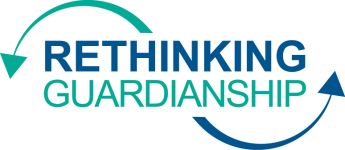Frequently Asked Questions
Click to Download Rethinking Guardianship Frequently Asked Questions (FAQs)
Click to Download FAQs by Guardians about the COVID-19 Pandemic
Selected FAQs:
Q: What is guardianship?
A: Guardianship is a legal relationship under which a person or agency (the guardian) is appointed by a court to make decisions and act on behalf of an adult deemed incapacitated (the ward) with respect to their personal affairs, financial affairs, or both. Less restrictive alternatives that can maintain the person safely in the community may be pursued before guardianship is considered.
Q: What is General Guardianship?
A: General Guardianship is guardianship of the “person” and of the “estate” of the person under guardianship.
Q: What is Limited Guardianship?
A: Limited Guardianship is one in which the guardianship order expressly limits the guardian’s powers or permits a person under guardianship to retain certain legal rights or privileges that are within their comprehension and judgment. These limits must be specified in detail in the Order on Application for Appointment of Guardian.
Q: What are the alternatives to guardianship?
A: Alternatives to guardianship are many and varied and mostly fall into two categories. The first includes supported decision-making, planning, and crisis management, and the second includes assistance with finances.
Q: When are alternatives to guardianship appropriate?
A: Guardianship is a legal relationship under which a person or agency (the guardian) is appointed by a court to make decisions and act on behalf of an adult deemed incapacitated (the ward) with respect to the ward’s personal affairs, financial affairs or both. When a person does not meet the criteria for incompetency but needs assistance managing some aspects of living, less restrictive alternatives that can maintain the person safely in the community may be pursued.
Q: What is Supported Decision Making?
A: “Supported Decision Making” consists of building a support team for a person who needs help making decisions. This model empowers the individual to make decisions with support from an individual or network of people. Support may include friends, family, community members or other trusted individuals. Whether or not someone needs guardianship may depend on the supports the person has in the community and at home. A person with a cognitive disability who does not have the capacity to manage all of the details of their life may not need a guardian if they can and do rely on others who are available to support them. Home health agencies exist to assist with Activities of Daily Living (ADL), cooking and cleaning, but the individuals being supported can still make decisions about their own care. In addition to home health care agencies, Medicaid offers skilled nursing care that can provide nursing services. Supported Decision Making expects that all people with disabilities can develop as decision-makers. This model understands that making mistakes and poor choices are all part of being human and everyone has a right to make those mistakes.

